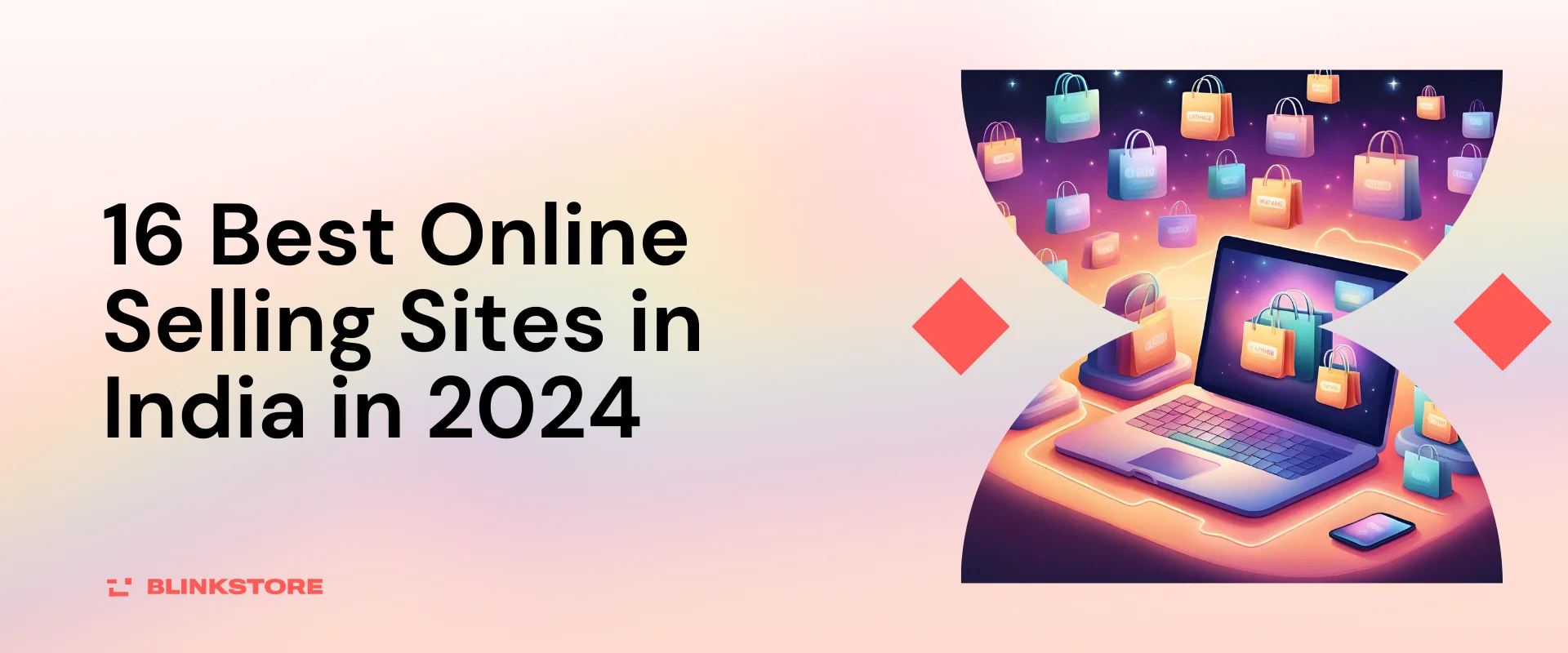Did you know, that India’s e-commerce sector is expected to contribute over 15% to the country’s total retail sales. The Indian e-commerce market is predicted to increase by 21.5% in 2022, reaching US$ 74.8 billion, and is expected to reach US$ 350 billion by 2030. This fact underscores the unprecedented growth and opportunities unfolding in the Indian online marketplace.
Table of Contents
Whether you’re a budding entrepreneur looking to launch your e-commerce store or an experienced seller looking for the best platforms. Although selling online through marketplaces has advantages, it is critical to consider factors such as fees and transaction costs when deciding on the best platform.
Launch Your Own E-commerce Store
Launching your online store may appear to be too risky, but it is not as difficult as you believe. However, if done correctly, it can be extremely rewarding and beneficial. The only issue is that you will need to drive traffic to your site, which will take time and effort.
Your main advantage is that you can keep all your profits for yourself without any fees or extra charges. Sounds interesting right? Then let’s build your online store with Blinkstore.
Blinkstore
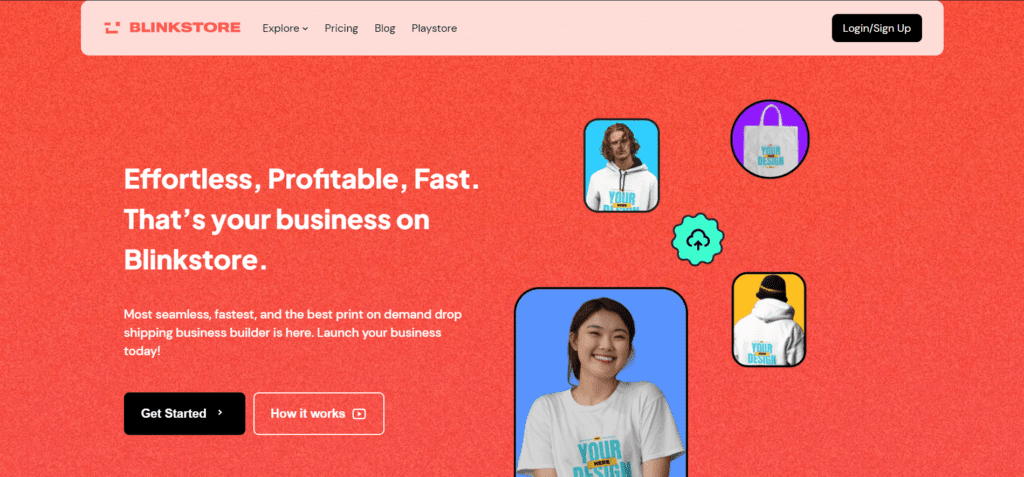
Blinkstore is an Indian user-friendly platform that specializes in creating and selling customized products. It offers tools and resources to individuals, students, entrepreneurs, influencers, and organizations for you to start your free online store and sell your customized products online.
Some benefits to know :
- Blinkstore: Free all-in-one platform for online store setup, product customization, and order fulfillment.
- User-Friendly: No technical expertise is required for setup.
- Diverse Catalog: Offers a wide range of customized products.
- Free Features: Essential features like a store website, mockup generator, and mobile app are provided.
Top 16 Online Selling Sites in India
Here, we have provided various online selling sites that you can check out:
- Amazon India
- Flipkart
- Snapdeal
- Myntra
- ShopClues
- Tata Cliq
- Ajio
- Pepperfry
- Paytm Mall
- FirstCry
- eBay India
- Etsy
- Limeroad
Free online selling sites:
- OLX
- Facebook Marketplace
- Quikr
1. Amazon India
Undoubtedly a giant in the global e-commerce space, Amazon India caters to a wide spectrum of consumer needs, providing an extensive selection of products across categories such as electronics, fashion, books, and more. Its robust marketplace model allows third-party sellers to reach a vast customer base.
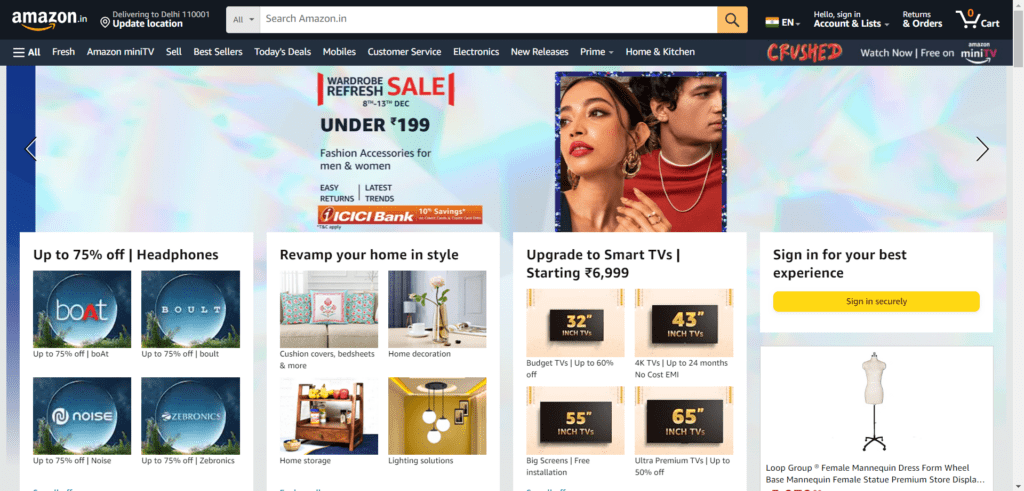
Notable points:
- Seller Central: Amazon’s Seller Central provides a comprehensive dashboard for sellers to manage inventory, track orders, and analyze performance.
- Fulfillment Services: Sellers can opt for Fulfillment by Amazon (FBA) for storage, packing, and shipping of products.
Pros:
- Vast product selection.
- Reliable delivery and customer service.
- Amazon Prime benefits.
Cons:
- Intense competition makes it challenging for smaller sellers.
- Fees and commissions can be relatively high.
2. Flipkart
A homegrown success story, Flipkart has established itself as one of the largest e-commerce platforms in India. Known for its diverse product range, including electronics, fashion, and home goods, Flipkart often draws attention with its exclusive product launches and festive season sales.

Notable points:
- Flipkart Seller Hub: The Seller Hub offers a centralized interface for managing listings, orders, and payments.
- Logistics Support: Flipkart provides logistics and delivery support through its logistics arm, Ekart.
Pros:
- Large customer base.
- Regular sales and discounts.
- User-friendly interface.
Cons:
- Seller fees may impact profit margins.
- High competition, especially in certain categories.
3. Snapdeal
Operating as a marketplace connecting buyers with a myriad of sellers, Snapdeal focuses on offering daily deals and discounts across a wide array of products. Its platform serves as a meeting point for sellers of varying scales, contributing to a diverse product catalog.
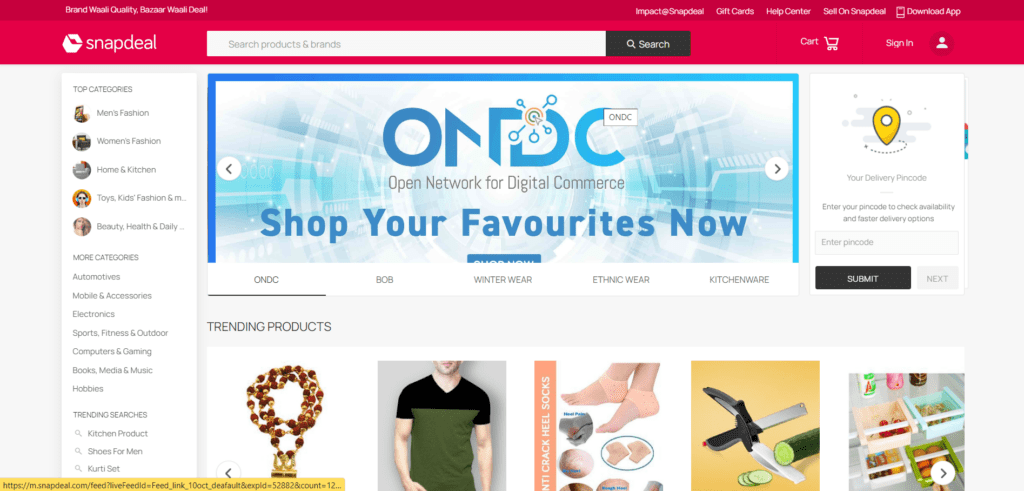
Notable points:
- Snapdeal Seller Zone: Sellers can use the platform’s Seller Zone for account management, order processing, and performance analytics.
- Easy Listing: Snapdeal simplifies the listing process for sellers to showcase their products effectively.
Pros:
- Diverse product categories.
- Seller-friendly policies.
Cons:
- Lower traffic compared to Amazon and Flipkart.
- Past issues with product quality.
4. Myntra
Specializing in fashion and lifestyle products, Myntra is recognized for its curated collection of clothing, footwear, and accessories. It has become a go-to platform for fashion enthusiasts seeking both domestic and international brands.
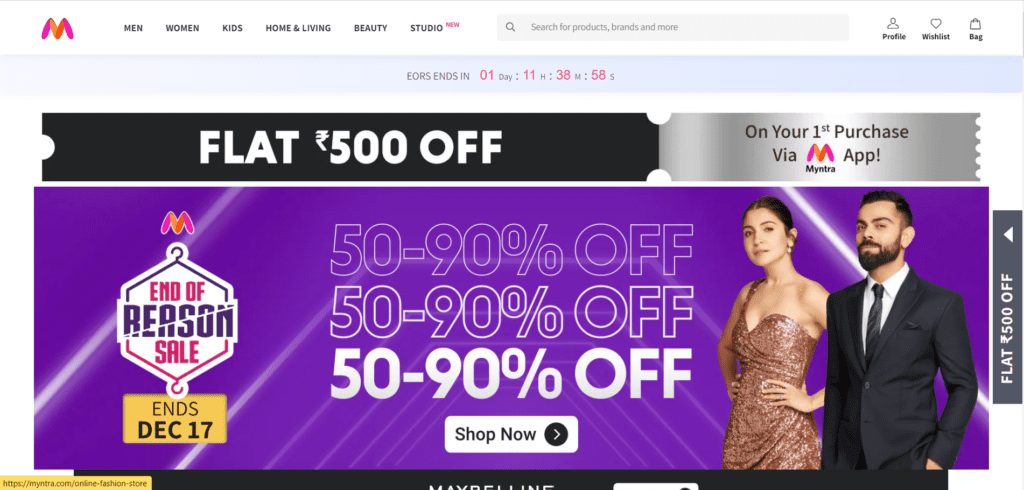
Notable points:
- Myntra Seller Platform: Sellers can leverage Myntra’s platform to showcase and manage their fashion products.
- Brand Collaborations: Myntra collaborates with sellers and brands, providing opportunities for visibility and promotion.
Pros:
- Focus on fashion and lifestyle.
- Regular sales and exclusive brands.
Cons:
- Limited to fashion, limiting the target audience.
- Returns and cancellations can impact sellers.
5. eBay India
As a globally recognized online marketplace, eBay India serves as a versatile platform for sellers, allowing them to list an extensive array of products, ranging from electronics to fashion and collectibles. With options for both auction-style and fixed-price sales, eBay provides sellers with flexibility in their selling approach. Notably, the platform’s international reach opens doors for Indian sellers to tap into a global market. The eBay Guarantee program ensures buyer protection, fostering trust in online transactions and enhancing the overall selling experience.
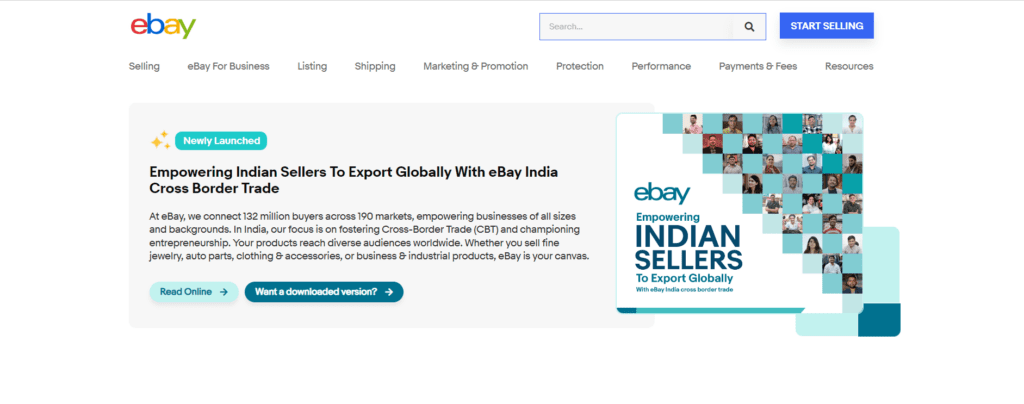
Notable points:
- Seller Tools: eBay’s Seller Hub offers a centralized dashboard for managing listings, tracking sales, and analyzing performance, providing valuable insights to sellers.
- International Selling: eBay allows Indian sellers to tap into international markets, facilitating cross-border trade and expanding their customer base.
Pros:
- Operates as a global marketplace, providing a diverse range of products.
Cons:
- Experiences intense competition, imposes various fees, and carries inherent auction risks.
6. ShopClues
Operating as an online marketplace, ShopClues facilitates the interaction between buyers and sellers, offering a diverse range of products at varying price points. Its emphasis on bringing affordable options to consumers sets it apart.
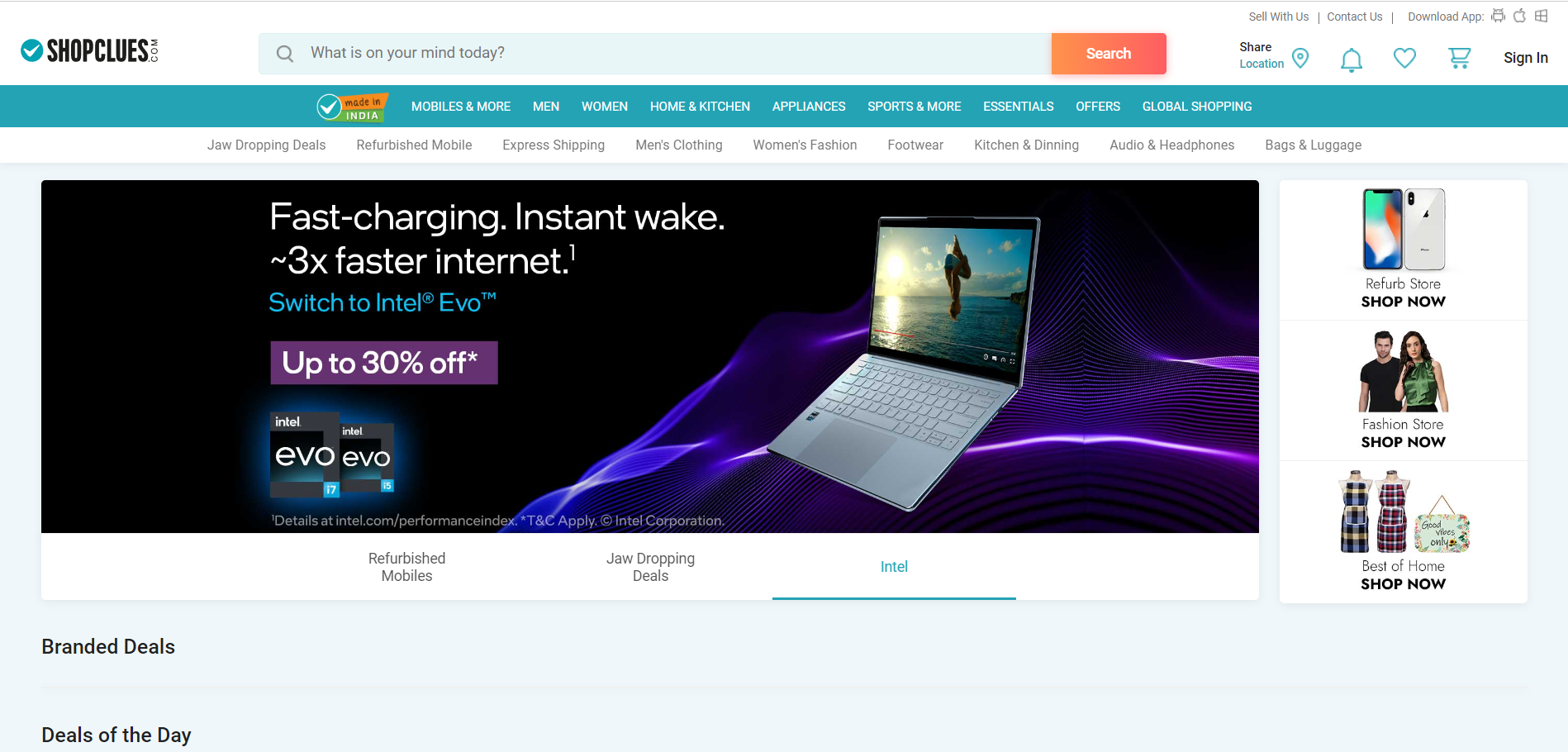
Notable points:
- ShopClues Merchant Platform: Sellers can use the platform for easy product listing, order processing, and customer management.
- Payment Integration: ShopClues facilitates secure payment transactions for sellers and buyers.
Pros:
- Focus on small and medium-sized sellers.
- Budget-friendly products.
Cons:
- Limited customer trust compared to larger platforms.
- Seller reviews can vary.
7. Tata Cliq
Backed by the reputable Tata Group, Tata Cliq presents a unique blend of traditional and modern retail. It offers a curated selection of products, including apparel, electronics, and more, with a focus on quality and reliability.

Notable points:
- Tata Cliq Seller Portal: Sellers can access a dedicated portal for managing their products, orders, and performance.
- Brand Collaborations: Tata Cliq collaborates with brands to provide a platform for sellers to showcase their products.
Pros:
- Emphasis on quality and branded products.
- Integration with Tata Group.
Cons:
- Smaller customer base.
- Competition with other established platforms.
8. Ajio
Part of the Reliance Retail portfolio, Ajio has carved a niche for itself in the fashion e-commerce space. With a curated fashion collection, it seamlessly blends Indian and international styles to cater to diverse tastes.

Notable points:
- Ajio Seller Dashboard: Sellers have access to a user-friendly dashboard for managing their fashion products.
- Reliance Collaboration: Being part of Reliance, Ajio may offer collaboration opportunities and increased visibility.
Pros:
- Owned by Reliance, ensuring reliability.
- Focus on fashion and lifestyle.
Cons:
- Limited product categories.
- Strong competition in the fashion sector.
9. Pepperfry
Addressing the home and furniture segment, Pepperfry is a go-to platform for those seeking a wide range of home decor options. Its eclectic mix of styles and designs caters to various aesthetic preferences.

Notable points:
- Pepperfry Seller Panel: Sellers can use the dedicated panel to list and manage their furniture and home decor products.
- Marketing Collaborations: Pepperfry collaborates with sellers for marketing and promotional activities.
Pros:
- Specialized in furniture and home decor.
- Regular sales and discounts.
Cons:
- Limited product range.
- Returns and logistics challenges with bulky items.
10. Paytm Mall
Integrating online shopping with digital wallet services, Paytm Mall has positioned itself as a comprehensive platform. Consumers can explore and purchase products while leveraging the convenience of Paytm’s digital payment solutions.
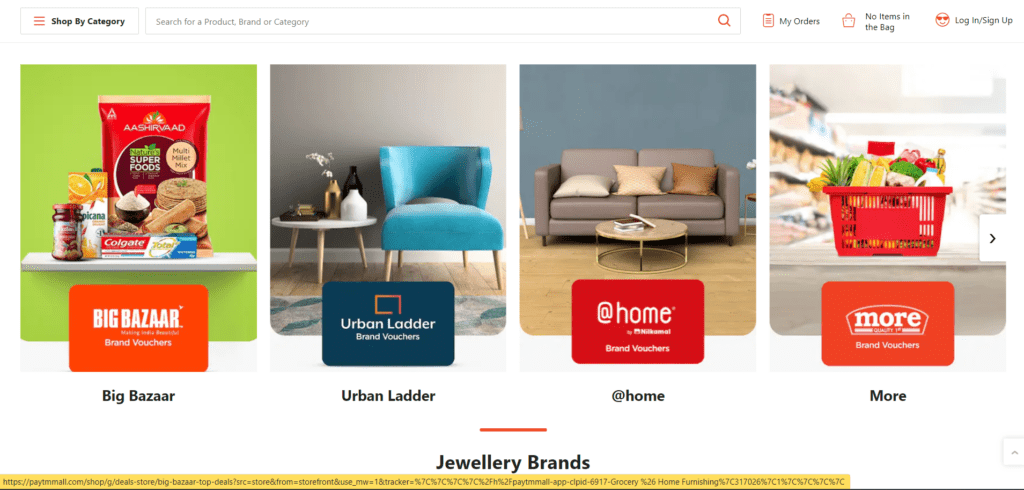
Notable points:
- Paytm Seller Dashboard: The Seller Dashboard enables sellers to manage listings, orders, and payments seamlessly.
- Digital Payments Integration: Integration with the Paytm wallet facilitates secure and convenient transactions.
Pros:
- Integration with Paytm wallet.
- Cashback and promotional offers.
Cons:
- Limited product categories.
- Smaller customer base.
11. FirstCry
Catering exclusively to parents and children, FirstCry specializes in baby and kids’ products. From clothing to toys and accessories, it offers a comprehensive range, making it a one-stop destination for all parenting needs.
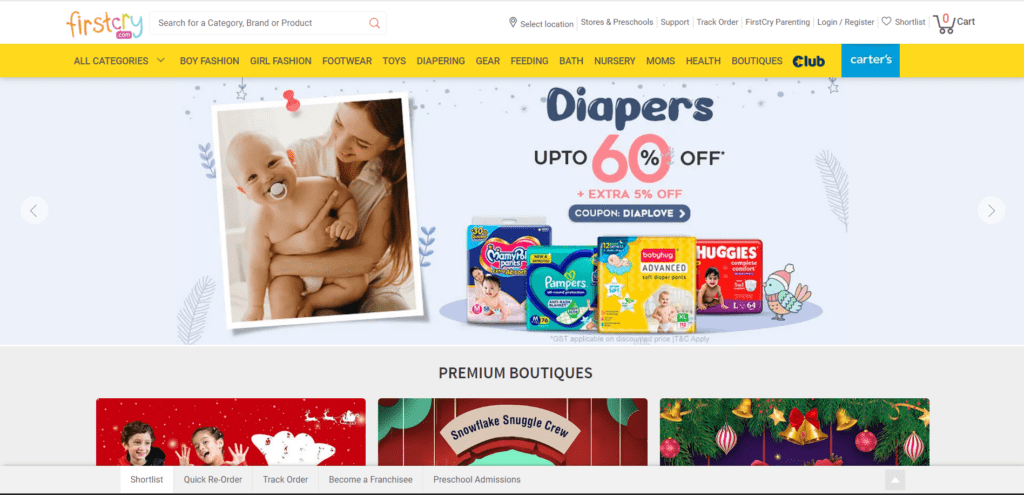
Notable points:
- FirstCry Seller Panel: Sellers specializing in baby and kids’ products can utilize the platform’s dedicated panel.
- Exclusive Partnerships: FirstCry may offer exclusive partnerships to showcase and promote sellers’ products.
Pros:
- Specialized in baby and kids’ products.
- Extensive product range for parents.
Cons:
- Niche market, limiting the customer base.
- Competition with other baby product platforms.
12. Etsy
Renowned for its emphasis on handmade, vintage, and unique products, Etsy stands out as a platform that caters to individual artisans and small businesses. Sellers on Etsy contribute to a creative community, showcasing their craftsmanship and offering consumers a curated selection of distinctive items. Etsy’s focus on artisanal creations makes it an ideal platform for sellers with unique, personalized, or one-of-a-kind products, creating a niche market within the e-commerce landscape.
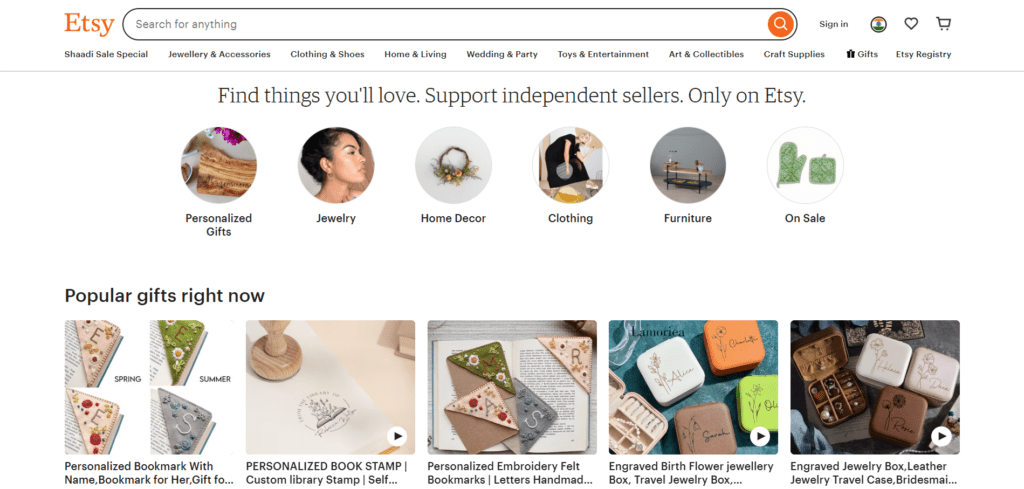
Notable points:
- User-Friendly Shop Setup: Setting up a shop on Etsy is user-friendly, allowing sellers to showcase their products with ease, accompanied by detailed descriptions and high-quality visuals.
- Artisan Community: Etsy fosters a sense of community among sellers, encouraging collaboration and networking within the artisan and handmade industry.
Pros:
- Offers a collection of unique handmade and vintage items, known for seller-friendly policies.
Cons:
- Faces high competition, charges fees, and has a limited range of product categories.
13. Limeroad
Limeroad is a fashion-centric online marketplace that brings together a curated collection of apparel, accessories, and home decor. The platform is known for its style-centric approach, offering sellers a space to showcase trendy products. Limeroad’s unique feature allows users to create and share their looks, promoting a sense of community and engagement. Sellers on Limeroad can tap into the platform’s fashion-forward audience, making it an attractive space for those in the fashion and lifestyle industry.

Notable points:
- Style Council: The Style Council feature allows users to create and share looks, encouraging user engagement and enhancing product visibility.
- Seller Support: Limeroad provides support and tools for sellers, assisting them in managing their inventory, processing orders, and optimizing their presence on the platform.
Pros:
- Focuses on the latest fashion trends, introduces a unique “Scrapbook” feature, and regularly features attractive deals and discounts.
Cons:
- Holds a more restricted market share, concentrates on specific categories, and may encounter occasional issues related to returns and customer service.
Popular Online Selling Sites in India for Free
Here are some free online selling sites in India for you:
14. OLX
As a leading online classifieds platform, OLX enables free listings for a wide range of products, fostering local connections and emphasizing user-friendly simplicity. The intuitive interface allows detailed descriptions and image showcasing, contributing to OLX’s popularity. A survey revealed that 80% of users find it easy to navigate, highlighting OLX’s commitment to user satisfaction.
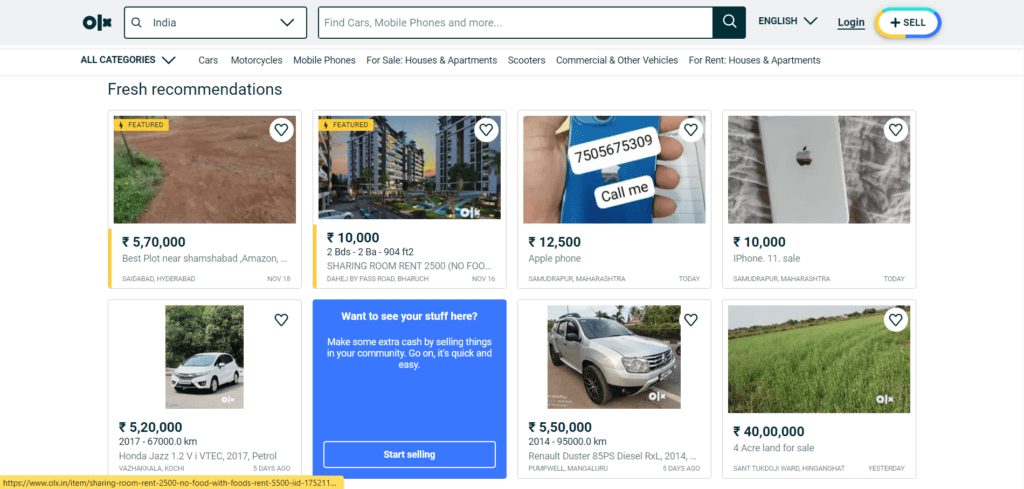
Pros:
- Free Listings: OLX allows users to create free listings, making them accessible to individuals and businesses.
- Local Focus: Emphasis on local connections fosters transactions within communities.
Cons:
- Limited Reach: While local focus is an advantage, it may limit exposure for those targeting a broader audience.
- Competition: High user participation can result in increased competition for visibility.
15. Facebook Marketplace
Positioned as an extension of Facebook, Marketplace offers a seamlessly integrated, user-friendly platform for localized buying and selling. With free listings and direct communication between buyers and sellers, it caters to a vast range of products.
Pros:
- Seamless Integration: Integrated with Facebook, Marketplace provides a familiar environment for users.
- Extensive User Base: The platform benefits from Facebook’s massive user base, enhancing listing visibility.
Cons:
- Privacy Concerns: Integration with Facebook profiles may raise privacy concerns for some users.
- Moderation Challenges: User-generated content may pose challenges in moderating listings.
16. Quikr
Recognized for its versatility, Quikr allows free ads across diverse categories, transforming into a one-stop marketplace. Its user-friendly interface and community-focused approach, along with features like Quikr Bazaar for second-hand goods, contribute to its effectiveness. Statistics indicate over 2 million daily active users, emphasizing Quikr’s success in connecting individuals and businesses with potential buyers.
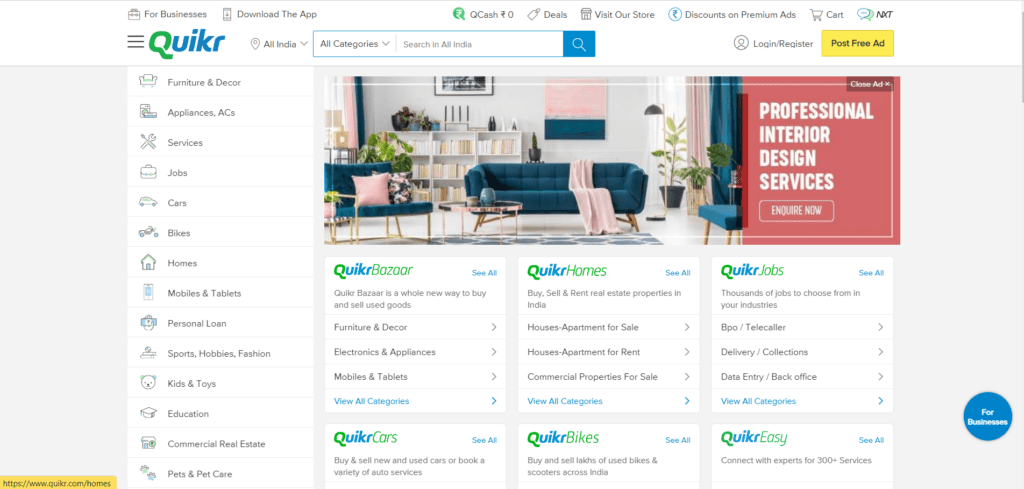
Pros:
- Versatility: Quikr covers diverse categories, including jobs, real estate, and vehicles.
- Free Ads: Users can post ads for free, enhancing accessibility.
Cons:
- Competition: High user engagement may result in increased competition for attention.
- Varied User Experience: Some users may find the experience inconsistent across different categories.
Conclusion: Find Your Online Selling Site
Choosing the best online selling site depends on various factors. You have to consider the nature of your products, target audience, platform policies, and seller support. Also, real-life examples and case studies will help you formulate ideas and strategies for your business.
There you have it—the comprehensive guide to the 16 best online selling sites in India in 2024. From giants like Amazon to specialized platforms like Limeroad, each offers a unique opportunity to amplify your sales and grow your business.
Some Related Resources for You to Check Out:
Top 15 Best Ecommerce Sites in India
How To Start an Ecommerce Business In India
The Complete Guide To Creating & Selling Your Custom Merchandise
FAQs
Here are some frequently asked questions about online selling sites.
Which online site is best for selling in India?
The ideal online selling site in India depends on factors like product type, target audience, and preferences. Popular choices include Amazon, Flipkart, and Snapdeal for diverse products, while Etsy suits unique or handmade items.
How to make an online selling site?
Choose a Niche: Decide on the products you’ll sell.
Domain and Hosting: Purchase a domain and reliable hosting.
E-commerce Platform: Use Blinkstore, WooCommerce, or Magento.
Product Listings: Add detailed listings with clear descriptions and images.
Payment Gateway: Set up a secure payment method.
Shipping: Plan efficient logistics.
Marketing: Implement strategies for site traffic.
How to sell on online sites?
Choose a Platform: Select a site based on your product and audience.
Create an Account: Sign up as a seller.
List Products: Create attractive listings.
Pricing: Set competitive prices.
Shipping: Implement effective logistics.
Customer Service: Provide excellent service.
Marketing: Use platform tools and external methods.
What is the best online selling site?
The best online selling site is chosen based on your needs. Amazon and eBay are global choices, while Flipkart and Etsy cater to specific markets. Consider your audience, product type, and desired features.
How do online selling sites work?
Online selling sites provide a platform for sellers to list, sell, and fulfill orders. Sellers create accounts, list products, and handle packaging. Buyers browse, make purchases, and complete transactions online. The platform facilitates payment processing and often offers marketing tools, analytics, and support.
